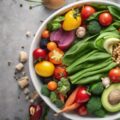The Plant-Based Pioneers Behind Forks Over Knives
Alona Pulde and Matthew Lederman are names that resonate deeply within the plant-based community. As the masterminds behind the groundbreaking documentary “Forks Over Knives,” this dynamic duo has been at the forefront of promoting a whole-food, plant-based lifestyle for optimal health and wellbeing. Their work has inspired countless individuals to embrace compassionate eating habits that nourish both body and soul.
But what does the inside of these plant-based pioneers’ refrigerators look like? Let’s take a peek inside their kitchens and explore the foods that fuel their passion for health and wellness.
A Rainbow of Fresh Produce
Upon opening Alona and Matthew’s refrigerators, one is immediately struck by the vibrant array of colors. Fresh fruits and vegetables dominate the shelves, creating a veritable rainbow of nutritious options. From leafy greens like kale, spinach, and Swiss chard to colorful bell peppers, carrots, and purple cabbage, their fridges are a testament to the beauty and diversity of plant-based eating.
These whole foods form the foundation of their meals, providing essential vitamins, minerals, and fiber. The abundance of produce reflects their commitment to eating a variety of plant foods to ensure a wide range of nutrients and promote overall health.
Plant-Based Proteins and Whole Grains
While fruits and vegetables take center stage, Alona and Matthew’s fridges also contain an assortment of plant-based proteins and whole grains. Containers of cooked lentils, chickpeas, and black beans are readily available for quick meal additions. These legumes not only provide protein but also offer fiber and complex carbohydrates for sustained energy.
Whole grains like quinoa, brown rice, and millet are often prepared in advance and stored in the refrigerator. These nutrient-dense foods serve as the perfect base for Buddha bowls, stir-fries, and hearty salads, demonstrating that a plant-based diet can be both satisfying and diverse.
Homemade Sauces and Dressings
One of the secrets to Alona and Matthew’s delicious plant-based meals lies in their collection of homemade sauces and dressings. Glass jars filled with vibrant concoctions line the refrigerator door, offering a glimpse into their culinary creativity. From zesty lemon tahini dressing to savory mushroom gravy, these homemade additions elevate simple ingredients into gourmet plant-based dishes.
By preparing their own sauces and dressings, Alona and Matthew avoid the processed ingredients and added oils often found in store-bought versions. This approach aligns with their philosophy of whole-food, plant-based eating and allows them to control the flavors and nutritional content of their meals.
Mindful Indulgences and Treats
While Alona and Matthew advocate for a whole-food, plant-based diet, their refrigerators also reveal a balanced approach to eating. Tucked away on a shelf, one might find a bar of dark chocolate or a container of homemade energy balls. These mindful indulgences demonstrate that a healthy lifestyle can include occasional treats, enjoyed in moderation.
Their approach to food is not about restriction or deprivation but rather about nourishing the body with wholesome, plant-based foods while still finding joy in eating. This balanced perspective has undoubtedly contributed to the success and sustainability of their plant-based lifestyle.
Inspiring a Compassionate Lifestyle
Peering into Alona Pulde and Matthew Lederman’s refrigerators offers more than just a glimpse of their eating habits; it provides insight into their values and the compassionate lifestyle they promote. Their fridges are a reflection of their commitment to health, environmental sustainability, and animal welfare.
By choosing plant-based foods, they demonstrate that it’s possible to thrive on a diet that is kind to our bodies, the planet, and animals. Their refrigerators serve as an inspiration for those looking to embrace a more compassionate and health-conscious way of living.
FAQ: Plant-Based Living with Alona Pulde and Matthew Lederman
1. What inspired Alona and Matthew to adopt a plant-based lifestyle?
Alona and Matthew were initially drawn to plant-based eating through their medical training and research on the health benefits of whole-food, plant-based diets. They were inspired by the potential to prevent and reverse chronic diseases through dietary changes, which led them to adopt this lifestyle personally and promote it professionally.
2. How do Alona and Matthew ensure they get enough protein on a plant-based diet?
They obtain adequate protein by consuming a variety of plant-based sources such as legumes (beans, lentils, peas), whole grains, nuts, and seeds. By eating a diverse range of these foods throughout the day, they easily meet their protein needs without relying on animal products.
3. What are some of Alona and Matthew’s favorite quick and easy plant-based meals?
Some of their go-to meals include hearty grain bowls topped with roasted vegetables and legumes, vegetable-packed stir-fries served over brown rice, and large salads with a variety of colorful vegetables and a homemade dressing. These meals are nutritious, satisfying, and simple to prepare.
4. How do Alona and Matthew address concerns about nutrient deficiencies on a plant-based diet?
They emphasize the importance of eating a varied diet rich in whole plant foods to obtain most essential nutrients. They recommend supplementing with vitamin B12, which is not naturally found in plant foods. They also suggest getting regular blood tests to monitor nutrient levels and adjust their diet or supplementation as needed.
5. What advice do Alona and Matthew have for those transitioning to a plant-based diet?
Their key advice is to take it step by step. Start by incorporating more plant-based meals into your routine and gradually reduce animal products. Focus on whole foods rather than processed vegan alternatives. Experiment with new recipes and ingredients to keep meals exciting and varied. Most importantly, be patient with yourself and remember that any step towards a more plant-based diet is a positive one for your health and the planet.









